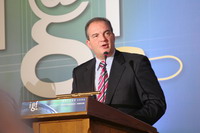Costas Karamanlis's government wins midnight roll call vote
Greece's re-elected government narrowly won a vote of confidence, following a three-day debate marking the outset of its new term.

As expected, Conservative Prime Minister Costas Karamanlis's government won the midnight roll call vote on straight party lines, 152 to 148. Main opposition Socialist PASOK voted against, as did the Communists, the Left Coalition and the far-right populist LAOS party, holding its first-ever parliamentary representation.
"I am determined to do all I can to push the country forward," Karamanlis said in wrapping up over 12 hours of debate. "The problems which we face are many, there is no time to lose."
More than 60 of the 300 deputies spoke at the first legislative session since the Sept. 16 election.
Highlighting his program featuring pension and education reform, Karamanlis rejected polarization and insisted his governing approach was inclusive. "Our choice is to go forward with dialogue, understanding and synthesis," he said.
He also defended his decision - unveiled after the election - to push ahead with a new electoral law. Nearly every Greek government since democracy was restored in 1974 has altered the electoral system, but his surprise announcement was widely denounced by the opposition as opportunistic or worse, and several Socialist deputies including Evangelos Venizelos, a candidate for his party's leadership, attacked Karamanlis personally.
The change would only take effect after the next elections, due by September 2011.
Karamanlis' New Democracy party dropped 13 seats from its 165 in the previous parliament. The current system gives the winning party a 40-seat bonus, and he indicated this could rise "without harming proportional representation."
Socialist leader George Papandreou accused the government of weakening Greece's international position while hailing past successes by his own party - which he served for five years as foreign minister - in dealing with Macedonia and bringing Cyprus into the European Union.
Foreign Minister Dora Bakoyannis insisted that Macedonia compromise on the issue of its name. "Under these (present) terms, there can be no progress in (Macedonia's) European and Euro-Atlantic prospects," she said, adding that Greece favored Turkish membership in the EU but "without blank checks."
Papandreou also challenged the government to do much more to help farmers and to reconstruct regions damaged by huge forest fires in August, which killed more than 65 people and overshadowed the election campaign. Earlier he had criticized government plans to sell off the public power corporation and Olympic Airlines "to foreign giants ... at bargain-basement prices."
Parliament on Monday begins debating the 2008 budget.
Subscribe to Pravda.Ru Telegram channel, Facebook, RSS!





